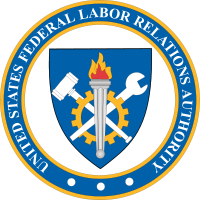
Federal Labor Relations Authority
Encyclopedia

Independent agencies of the United States government
Independent agencies of the United States federal government are those agencies that exist outside of the federal executive departments...
that governs labor relations
Labor relations
Industrial relations is a multidisciplinary field that studies the employment relationship. Industrial relations is increasingly being called employment relations because of the importance of non-industrial employment relationships. Many outsiders also equate industrial relations to labour relations...
between the federal government
Federal government of the United States
The federal government of the United States is the national government of the constitutional republic of fifty states that is the United States of America. The federal government comprises three distinct branches of government: a legislative, an executive and a judiciary. These branches and...
and its employees
United States civil service
In the United States, the civil service was established in 1872. The Federal Civil Service is defined as "all appointive positions in the executive, judicial, and legislative branches of the Government of the United States, except positions in the uniformed services." . In the early 19th century,...
.
Created by the Civil Service Reform Act of 1978
Civil Service Reform Act of 1978
The Civil Service Reform Act of 1978, , reformed the civil service of the United States federal government.The Civil Service Reform Act of 1978 abolished the U.S...
, it is a quasi-judicial body
Quasi-judicial body
A quasi-judicial body is an individual or organization which has powers resembling those of a court of law or judge and is able to remedy a situation or impose legal penalties on a person or organization.-Powers:...
with three full-time members who are appointed for five-year terms by the President
President of the United States
The President of the United States of America is the head of state and head of government of the United States. The president leads the executive branch of the federal government and is the commander-in-chief of the United States Armed Forces....
with the advice and consent
Advice and consent
Advice and consent is an English phrase frequently used in enacting formulae of bills and in other legal or constitutional contexts, describing a situation in which the executive branch of a government enacts something previously approved of by the legislative branch.-General:The expression is...
of the Senate
United States Senate
The United States Senate is the upper house of the bicameral legislature of the United States, and together with the United States House of Representatives comprises the United States Congress. The composition and powers of the Senate are established in Article One of the U.S. Constitution. Each...
. One member is appointed by the President to serve as chairman, chief executive officer
Chief executive officer
A chief executive officer , managing director , Executive Director for non-profit organizations, or chief executive is the highest-ranking corporate officer or administrator in charge of total management of an organization...
, and chief administrative officer
Chief administrative officer
A chief administrative officer is responsible for administrative management of private, public or governmental corporations. The CAO is one of the highest ranking members of an organization, managing daily operations and usually reporting directly to the chief executive officer. In some companies,...
of the FLRA. The chairman is also ex officio chairman of the Foreign Service Labor Relations Board.
The Authority adjudicates disputes arising under the Civil Service Reform Act, deciding cases concerning the negotiability of collective bargaining
Collective bargaining
Collective bargaining is a process of negotiations between employers and the representatives of a unit of employees aimed at reaching agreements that regulate working conditions...
agreement proposals, appeals concerning unfair labor practices and representation petitions, and exceptions to grievance arbitration awards. Consistent with its statutory charge to provide leadership in establishing policies and guidance to participants in the Federal labor-management relations program, the Authority also assists Federal agencies and unions in understanding their rights and responsibilities under the Statute through statutory training of parties.
In 1981 it decertified, that is stripped it from its status as a representative union, the air traffic controllers PATCO union, after the 1981 air traffic controllers strike.
The agency is separate from the National Labor Relations Board
National Labor Relations Board
The National Labor Relations Board is an independent agency of the United States government charged with conducting elections for labor union representation and with investigating and remedying unfair labor practices. Unfair labor practices may involve union-related situations or instances of...
, which governs private-sector labor relations.

